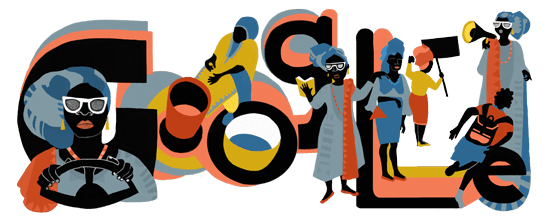Funmilayo Ransome-Kuti Biography
[spacer height=”50px”]
Who is Funmilayo Ransome-Kuti?
Francis Abigail Olufunmilayo Thomas was born on 25 October 1900, in Abeokuta, to Daniel Olumeyuwa Thomas (1869-1954) and Lucretia Phyllis Omoyeni Adeosolu (1874-1956) of the Jibolu-Taiwo family.
Her father was a son of a returned slave, Ebenezer Sobowale Thomas, from Sierra Leone, who traced his ancestral history back to Abeokuta in what is today Ogun State, Nigeria. He became a member of the Anglican faith, and soon returned to the homeland of his fellow Egbas.
These days in Nigeria Funmilayo Ransome-Kuti is often remembered as “Mama Fela”, the mother of Afrobeat legend, band leader and activist Fela Anikulapo-Kuti is being Funmilayo Ransome-Kuti Celebrated by Google.

see also : South African Xenophobia Attacks Has Killed Five People
But Ransome-Kuti was a legend in her own right particularly when it comes to the story of Nigeria’s battle for independence and for gender equality. That’s why Google has recognized the matriarchal icon for its users in Nigeria with a Google Doodle today (Oct. 25) on what would have been her 119th birthday.
During Nigeria’s colonial years Ransome-Kuti played a pivotal role in Nigeria’s southwestern region in taking on the British administrators and fighting for universal adult suffrage. When the British colonial officers refused to give permits for demonstrations, activist Funmilayo Ransome-Kuti mobilized local market women for what she called “picnics” and festivals.
“As for the charges against me, I am unconcerned,” said Ransome-Kuti, as she “fearlessly campaigned for women’s rights and the liberation of Africa from colonial rule.”
She was born in Abeokuta, the current capital of Nigeria’s Ogun state, the former Frances Abigail Olufunmilayo Thomas grew up witnessing Great Britain consolidating control over Nigeria.

As the grandchild of a slave, she became one of the first girls to enroll in Abeokuta Grammar School, before traveling to Cheshire in England to continue her education.
By the time she returned home, she’d dropped her birth names and preferred to speak Yoruba.
One of few women in early 1920s Nigeria to receive post-primary education, Ransome-Kuti used her privilege to coordinate the resistance against colonialism in Nigeria that not only targeted the British but also the local traditional figureheads they used to enforce their rules.

see also Design Your Professional Website, blogs plus Free google marketing
The Abeokuta Women’s Union, which she founded, protested unjust taxes, corruption and the lack of women’s representation in decision-making corridors.
As Quartz has previously noted the mother of anti-colonial activism in Nigeria is rarely celebrated outside of early primary school texts, but as her son once sang: “She’s the only mother of Nigeria.”
The doodle was illustrated by Nigerian-Italian guest artist Diana Ejaita, whose art work acknowledges Ransome-Kuti’s role as an educator, activist leader and as the first woman in Nigeria to drive a car.
Death of Funmilayo Ransome-Kuti
In old age her activism was overshadowed by that of her three sons, who provided effective opposition to various Nigerian military juntas. In 1978 Ransome-Kuti was thrown from a third-floor window in her son Fela’s compound, a commune known as the Kalakuta Republic, when it was stormed by one thousand armed military personnel. She lapsed into a coma in February of that year, and died on 13 April 1978 as a result of her injuries.
After Ransome-Kuti’s death, Fela took her coffin and travelled nearly twenty kilometers to Dodan Barracks in Lagos (then Nigeria’s Supreme Military Headquarters), leaving the coffin at the gate in an attempt to shame the government. The invasion, her death, and the movement of the coffin is detailed in his song “Coffin for Head of State”
see also : Muhammadu Buhari Untold Story and Net Worth
[spacer height=”40px”]
Fact Check
We strive for accuracy and fairness. If you see something that doesn’t look right, contact us!
Thanks for reading and remember to share this post on social media & stand a chance to win $10,000

